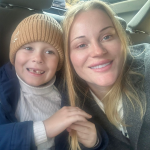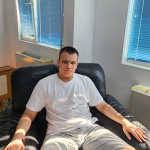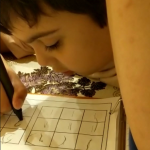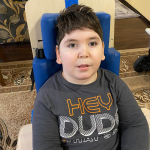Sensory alalia
The term ‘alalia’ is used to describe speech disorders. They occur in early childhood, coinciding with the start of speech. At that time, the type of pathology is also defined, depending on the additional symptoms accompanying the pathogenesis.
If a child has not only a speech delay but also problems with listening and understanding other people’s speech with normal hearing, it is called sensory alalia. Sensory alalia is currently difficult to treat because it is caused by pathological changes in the brain, which conservative methods cannot fully correct.
Disease clinical details and treatment
This pathology is characterised by dysfunctions of speech gnosis, i.e., the child is unable to analyse audible sounds and cannot make the connection between an object and its sound image. He/she can hear the other person’s speech but does not understand it. Consequently, normal learning and communication with relatives and society are practically impossible.
Diagnosing the disease is also quite difficult, as it requires excluding other problems, which may include hearing loss or mental dysfunction. Since this is very difficult to do in early childhood, the disease is mostly diagnosed at pre-school age.
Once a diagnosis has been made, a comprehensive treatment is prescribed. Treatment consists of medication therapy, work with a speech therapist, and, particularly, with a speech pathologist. However, this method of treatment is superficial, as it only deals with the symptoms. In some cases, surgery may be necessary to correct the structure of the organs responsible for speech.
Sensory alalia treatment using stem cells
This is an advanced method widely used in traditional medicine in the best clinics of the world. It is based on using the basic building cells of the human body, which are capable of transforming into the cells of any organ. When administered to adult organisms, the cells with defects are replaced by healthy ones. In this case, pathological cells are defined as the elements and parts of the brain responsible for speech and understanding.
Why is sensory alalia therapy with stem cells better than other methods?
- It is much better in terms of effectiveness, achieving stable and long-lasting results
- Unlike other methods, stem cell transplantation restores the correct cell structure of the brain
- It does not require complex preparation – everything you need for successful treatment is already present in the potential of the basic cells
- Importantly, there are almost no contraindications and no side effects. The procedure is well-tolerated by patients
- The cell therapy enhances the effects of other treatments. In other words, it is advisable to support its results with classical developmental methods to achieve optimal results.
To find out more about stem cell treatment, please contact our centre for a free initial consultation on the individual rationality and efficacy of this procedure. The doctor will not only answer all your questions but will also help you to determine the best source of autologous stem cell extraction.
Sensory alalia treatment at the Mardaleishvili Medical Centre is one of the best opportunities for your child to regain speech and normal brain function.
Autism Treatment Center Videos
Autism treatment with own stem cells
Cord blood association congress
International Quality Crown
Autism Treatment Reviews
Autism treatment with own stem cells
The story of Alessandro (6 years old)
Autism Patient Testimonial - Stem Cell Treatment
Clients Testimonials

Feedback from Igor, David’s father (12 years old) Read More

Feedback from Olga, Fedya’s mother Read More

Feedback from Natalia, Radomir’s mother (15 years old) Read More

Feedback from Esther, Samuel’s mother (8 years old) Read More

Feedback from Abibe, Selim’s mother (7 years old) Read More












